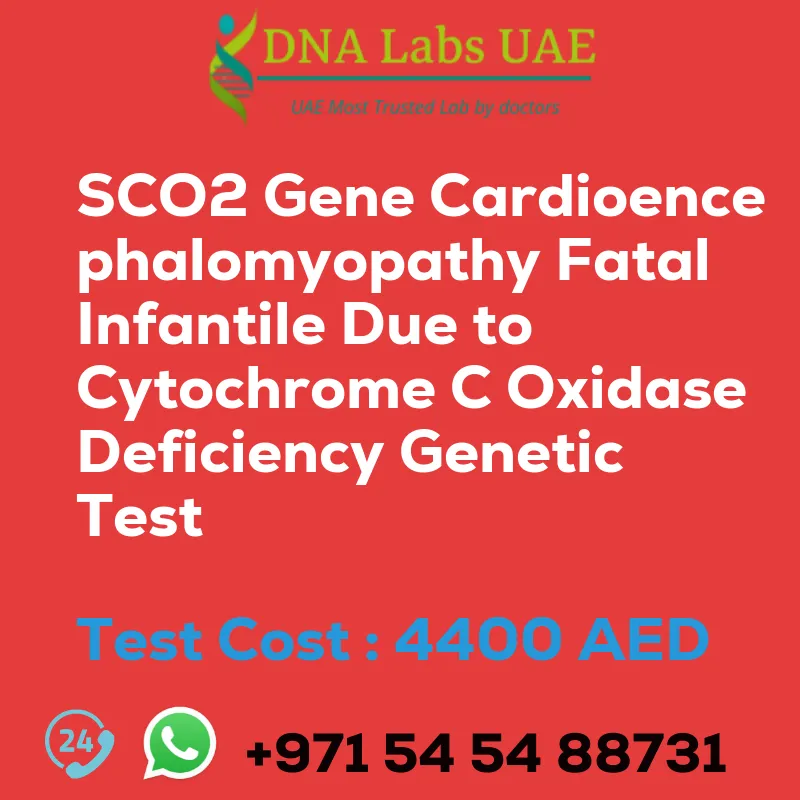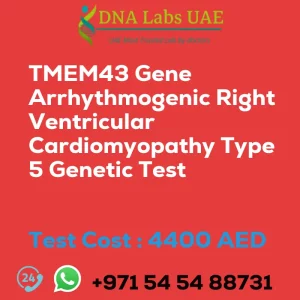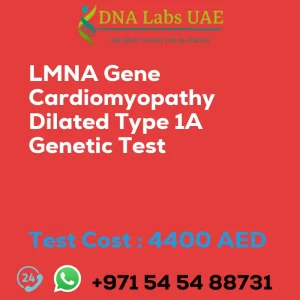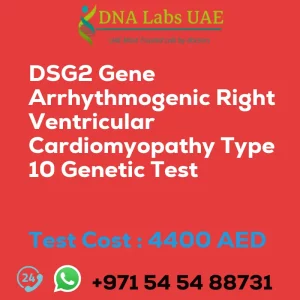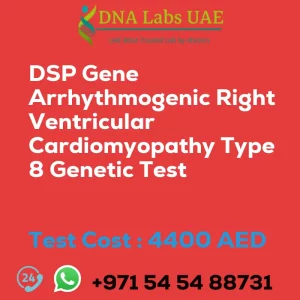SCO2 Gene Cardioencephalomyopathy Fatal Infantile Genetic Test
At DNA Labs UAE, we offer the SCO2 Gene Cardioencephalomyopathy Fatal Infantile Genetic Test. This test is designed to diagnose a rare genetic disorder characterized by severe cardiac and neurological symptoms. It is caused by mutations in the SCO2 gene, which affects the production of a protein called cytochrome c oxidase (COX) assembly protein.
Test Components and Price
The SCO2 Gene Cardioencephalomyopathy Fatal Infantile Genetic Test is priced at 4400.0 AED. The test can be performed using blood or extracted DNA samples, or even one drop of blood on an FTA card.
Report Delivery
Once the samples are received, the report will be delivered within 3 to 4 weeks.
Method
The SCO2 Gene Cardioencephalomyopathy Fatal Infantile Genetic Test utilizes NGS (Next-Generation Sequencing) technology for analysis.
Test Type and Doctor
The test falls under the category of Cardiovascular Pneumology Disorders and is typically referred by cardiologists. Our Genetics department handles the testing process.
Pre Test Information
Prior to the test, it is essential to provide the clinical history of the patient who will undergo the SCO2 Gene Cardioencephalomyopathy Fatal Infantile Genetic Test. A Genetic Counselling session will also be conducted to draw a pedigree chart of family members affected by the condition.
Test Details
SCO2 gene cardioencephalomyopathy, fatal infantile, due to cytochrome c oxidase deficiency is a rare genetic disorder characterized by severe cardiac and neurological symptoms. It is caused by mutations in the SCO2 gene, which provides instructions for producing a protein called cytochrome c oxidase (COX) assembly protein. COX is a key enzyme involved in cellular respiration, specifically in the final step of the electron transport chain. This enzyme plays a crucial role in the production of energy in the form of adenosine triphosphate (ATP) within mitochondria, the powerhouses of the cell.
Mutations in the SCO2 gene disrupt the assembly and function of COX, leading to a deficiency in its activity. The symptoms of SCO2 gene cardioencephalomyopathy, fatal infantile typically appear in infancy and can include severe cardiac involvement such as hypertrophic cardiomyopathy (enlarged heart), arrhythmias, and heart failure. Neurological symptoms may also be present, including developmental delay, muscle weakness, and seizures. The condition is progressive and often fatal in early childhood.
NGS (Next-Generation Sequencing) genetic testing can be used to diagnose SCO2 gene cardioencephalomyopathy, fatal infantile. This type of genetic testing allows for the simultaneous analysis of multiple genes, including the SCO2 gene, to identify mutations or variants that may be causing the condition. NGS can provide a comprehensive analysis of the patient’s genetic makeup, helping to confirm the diagnosis and guide treatment options.
Early diagnosis is crucial for managing the symptoms and providing appropriate medical care for individuals with SCO2 gene cardioencephalomyopathy, fatal infantile. Treatment options may include supportive care to manage cardiac symptoms, physical and occupational therapy to address developmental delays and muscle weakness, and seizure management for those experiencing seizures.
It is important to note that this response is for informational purposes only and should not be considered medical advice. If you suspect you or your child may have SCO2 gene cardioencephalomyopathy, fatal infantile, it is recommended to consult with a healthcare professional or a genetic counselor for a proper diagnosis and guidance regarding treatment options.
| Test Name | SCO2 Gene Cardioencephalomyopathy fatal infantile due to cytochrome c oxidase deficiency Genetic Test |
|---|---|
| Components | |
| Price | 4400.0 AED |
| Sample Condition | Blood or Extracted DNA or One drop Blood on FTA Card |
| Report Delivery | 3 to 4 Weeks |
| Method | NGS Technology |
| Test type | Cardiovascular Pneumology Disorders |
| Doctor | Cardiologist |
| Test Department: | Genetics |
| Pre Test Information | Clinical History of Patient who is going for SCO2 Gene Cardioencephalomyopathy, fatal infantile, due to cytochrome c oxidase deficiency NGS Genetic DNA Test. A Genetic Counselling session to draw a pedigree chart of family members affected with SCO2 Gene Cardioencephalomyopathy, fatal infantile, due to cytochrome c oxidase deficiency NGS Genetic DNA Test gene SCO2 |
| Test Details |
SCO2 gene cardioencephalomyopathy, fatal infantile, due to cytochrome c oxidase deficiency is a rare genetic disorder characterized by severe cardiac and neurological symptoms. It is caused by mutations in the SCO2 gene, which provides instructions for producing a protein called cytochrome c oxidase (COX) assembly protein. COX is a key enzyme involved in cellular respiration, specifically in the final step of the electron transport chain. This enzyme plays a crucial role in the production of energy in the form of adenosine triphosphate (ATP) within mitochondria, the powerhouses of the cell. Mutations in the SCO2 gene disrupt the assembly and function of COX, leading to a deficiency in its activity. The symptoms of SCO2 gene cardioencephalomyopathy, fatal infantile typically appear in infancy and can include severe cardiac involvement such as hypertrophic cardiomyopathy (enlarged heart), arrhythmias, and heart failure. Neurological symptoms may also be present, including developmental delay, muscle weakness, and seizures. The condition is progressive and often fatal in early childhood. NGS (Next-Generation Sequencing) genetic testing can be used to diagnose SCO2 gene cardioencephalomyopathy, fatal infantile. This type of genetic testing allows for the simultaneous analysis of multiple genes, including the SCO2 gene, to identify mutations or variants that may be causing the condition. NGS can provide a comprehensive analysis of the patient’s genetic makeup, helping to confirm the diagnosis and guide treatment options. Early diagnosis is important for managing the symptoms and providing appropriate medical care for individuals with SCO2 gene cardioencephalomyopathy, fatal infantile. Treatment options may include supportive care to manage cardiac symptoms, physical and occupational therapy to address developmental delays and muscle weakness, and seizure management for those experiencing seizures. It is important to note that this response is for informational purposes only and should not be considered medical advice. If you suspect you or your child may have SCO2 gene cardioencephalomyopathy, fatal infantile, it is recommended to consult with a healthcare professional or a genetic counselor for a proper diagnosis and guidance regarding treatment options. |

